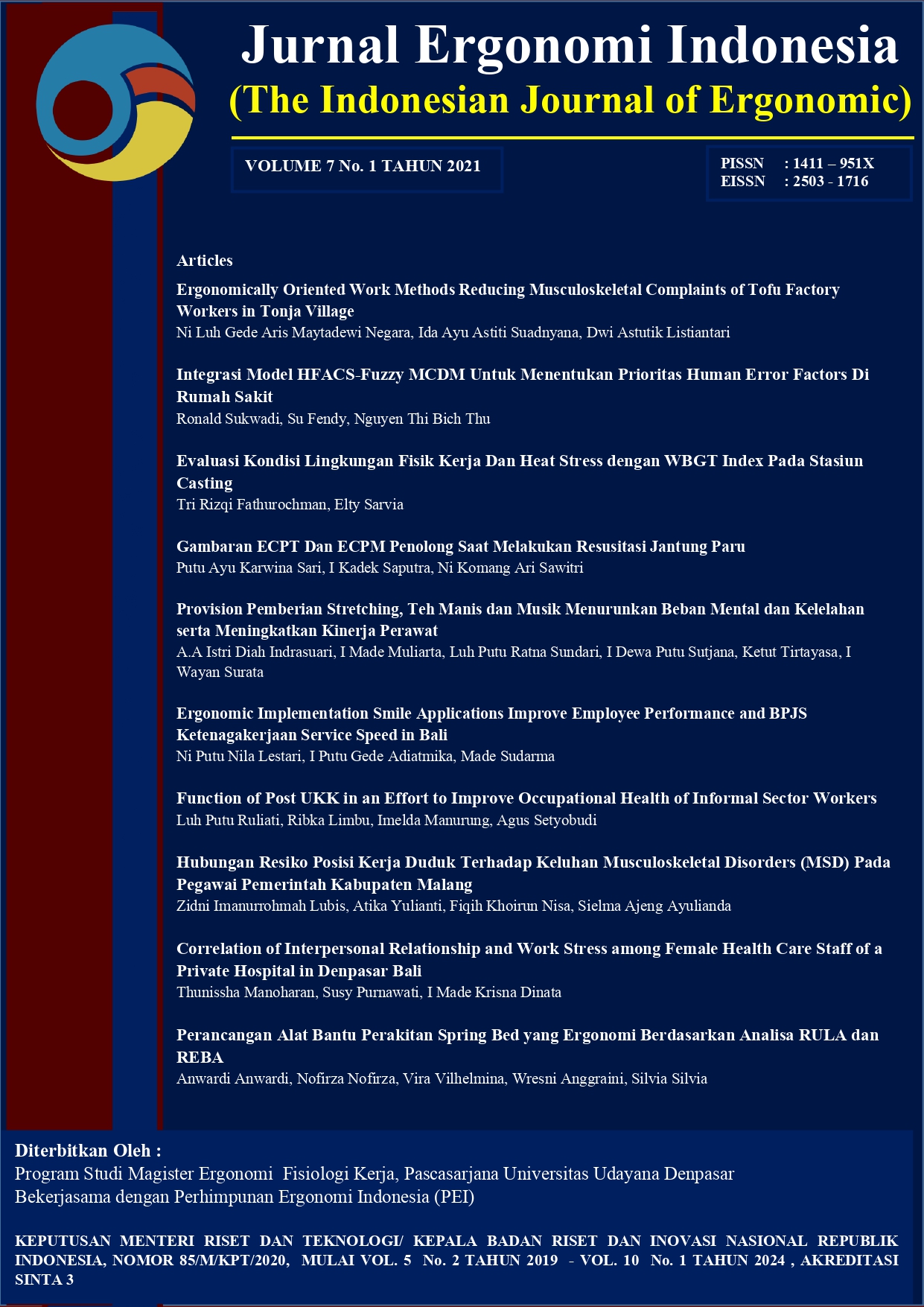Perancangan Alat Bantu Perakitan Spring Bed yang Ergonomi Berdasarkan Analisa RULA dan REBA
Abstract
CV. XYZis an industry engaged in the field of furniture producing spring bed, cabinets, buffets, chairs and others. At the spring bed assembly station, the worker assembles a springbed frame on the floor with a work position bent, squatting or sitting up to form a working posture with angles of 450 to 700 and does not use tools to support ergonomic position and posture. The purpose of this study was to design an ergonomic tools for conducted work activities on the skeleton spring bedassembly station use the RULA-REBA methods. The method of research is done by compared scores and levels before and after assembly tool design. The results show that REBA score is at 9/11 level and RULA is at 7/7 level which means that the current working condition must be improved and very unsafe for workers. After assembling the assembly tool use SolidWork software with dimension size is determined based on anthropometry data, where the height is 102 cm, length 204 cm, and width 134 cm. Then simulated use ErgoFellow 2.0 software, obtained REBA 4 and 5 score from 11 total level and RULA score is 3/7 level which means the risk of injury to worker in assembly station of skeleton of springbed can be minimized.
Downloads
References
Fonseca, Santos, Loureiro, Arezes (2016). Integrating Human Factors and Ergonomics in a Participatory Program for Improvements of Work Systems: an effectiveness study. In: Proceedings of the 2016 IEEE IEEM. 978-1-5090-3665-3/16: 1579–1583
Hignett, S. & McAtamney L. 2000. Rapid Entire Body Assessment (REBA). United Kingdom: Occupational Health and Ergonomic Service Ltd
Kazerouni, (2015). Integrating Occupational Health and Safety in Facility Layout Planning, part I: methodology. Int J Prod Res 53(11):3243–3259. https://doi.org/10.1080/00207543.2014. 970712
Mc Cormick EJ, Sander MS. 1982. Human Factors in Engineering and Design.Mc Graw Hill. New York.
Iridiastardi, 2015. Ergonomi Suatu Pengantar. Bandung: PT. Remaja Rosdakarya
Mufti, D., Eva, S. & Novia, S. 2013. Kajian Postur Kerja pada Pengrajin Tenun Songket Pandai Sikek. Padang: Universitas Bung Hatta
Nurhikmah, 2011, Faktor-faktor Yang Berhubungan dengan Musculoskeletal Disorder pada Pekerja Furnitur Di Kecamatan Benda, Jakarta Tangerang: Universitas Islam Negeri Syarif Hidayatullah.
Purnomo, 2012. Perancangan Sistem Kerja Berkelanjutan: Pendekatan Holistik untuk Meningkatkan Produktivitas Pekerja, Pidato Pengukuhan dalam Jabatan Guru Besar. UII Yogyakarta.
Suhardi, B. 2008. Perancangan Sistem Kerja dan Ergonomi Industri Jilid I. Jakarta: Direktorat Pembinaan Sekolah Menengah Kejuruan
Sulaiman, F. & Yossi, P.S. 2016. Analisis Postur Kerja Pekerja Proses Pengasahan Batu Akik dengan Menggunakan Metode REBA. Medan: Politeknik LP3I
Tarwaka, Solichul, H.A.B. & Lilik, S. 2004. Ergonomi untuk Kesehatan, Keselamatan Kerja dan Produktivitas. Surakarta: UNIBA Press
Ulfah. N., Siti Harwanti, Nurcahyo. P.J. (2014). Work Attitude and Musculoskeletal Disorders Risk in Laundry Worker. Jurusan Kesehatan Masyarakat FKIK Unsoed, Kampus Karangwangkal

















